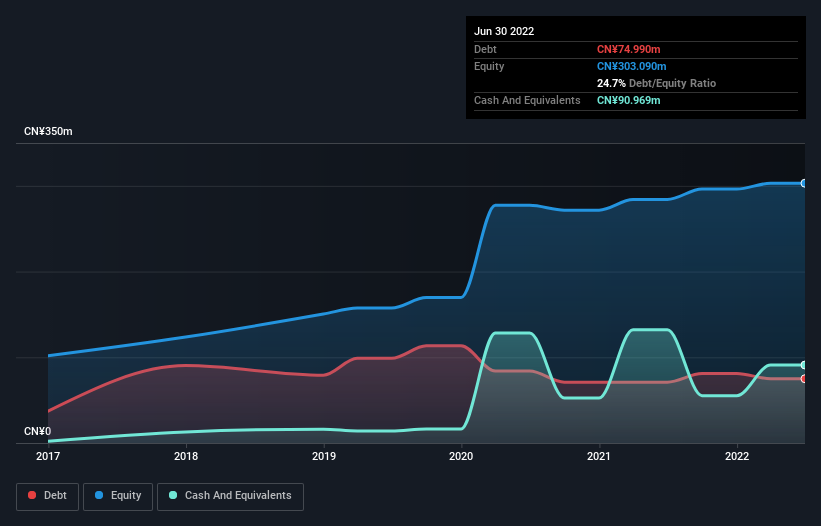These 4 Measures Indicate That JiaChen Holding Group (HKG:1937) Is Using Debt Reasonably Well

The external fund manager backed by Berkshire Hathaway's Charlie Munger, Li Lu, makes no bones about it when he says 'The biggest investment risk is not the volatility of prices, but whether you will suffer a permanent loss of capital.' So it might be obvious that you need to consider debt, when you think about how risky any given stock is, because too much debt can sink a company. Importantly, JiaChen Holding Group Limited (HKG:1937) does carry debt. But the more important question is: how much risk is that debt creating?
What Risk Does Debt Bring?
Debt is a tool to help businesses grow, but if a business is incapable of paying off its lenders, then it exists at their mercy. In the worst case scenario, a company can go bankrupt if it cannot pay its creditors. However, a more usual (but still expensive) situation is where a company must dilute shareholders at a cheap share price simply to get debt under control. Of course, the upside of debt is that it often represents cheap capital, especially when it replaces dilution in a company with the ability to reinvest at high rates of return. The first thing to do when considering how much debt a business uses is to look at its cash and debt together.
See our latest analysis for JiaChen Holding Group
What Is JiaChen Holding Group's Net Debt?
As you can see below, at the end of June 2022, JiaChen Holding Group had CN¥75.0m of debt, up from CN¥71.0m a year ago. Click the image for more detail. But on the other hand it also has CN¥91.0m in cash, leading to a CN¥16.0m net cash position.

How Strong Is JiaChen Holding Group's Balance Sheet?
Zooming in on the latest balance sheet data, we can see that JiaChen Holding Group had liabilities of CN¥124.4m due within 12 months and liabilities of CN¥58.0k due beyond that. Offsetting these obligations, it had cash of CN¥91.0m as well as receivables valued at CN¥168.6m due within 12 months. So it can boast CN¥135.1m more liquid assets than total liabilities.
This excess liquidity suggests that JiaChen Holding Group is taking a careful approach to debt. Due to its strong net asset position, it is not likely to face issues with its lenders. Simply put, the fact that JiaChen Holding Group has more cash than debt is arguably a good indication that it can manage its debt safely.
On top of that, JiaChen Holding Group grew its EBIT by 61% over the last twelve months, and that growth will make it easier to handle its debt. When analysing debt levels, the balance sheet is the obvious place to start. But it is JiaChen Holding Group's earnings that will influence how the balance sheet holds up in the future. So when considering debt, it's definitely worth looking at the earnings trend. Click here for an interactive snapshot.
Finally, a company can only pay off debt with cold hard cash, not accounting profits. While JiaChen Holding Group has net cash on its balance sheet, it's still worth taking a look at its ability to convert earnings before interest and tax (EBIT) to free cash flow, to help us understand how quickly it is building (or eroding) that cash balance. During the last three years, JiaChen Holding Group burned a lot of cash. While that may be a result of expenditure for growth, it does make the debt far more risky.
Summing Up
While it is always sensible to investigate a company's debt, in this case JiaChen Holding Group has CN¥16.0m in net cash and a decent-looking balance sheet. And it impressed us with its EBIT growth of 61% over the last year. So we don't think JiaChen Holding Group's use of debt is risky. The balance sheet is clearly the area to focus on when you are analysing debt. But ultimately, every company can contain risks that exist outside of the balance sheet. To that end, you should learn about the 3 warning signs we've spotted with JiaChen Holding Group (including 1 which can't be ignored) .
At the end of the day, it's often better to focus on companies that are free from net debt. You can access our special list of such companies (all with a track record of profit growth). It's free.
New: Manage All Your Stock Portfolios in One Place
We've created the ultimate portfolio companion for stock investors, and it's free.
• Connect an unlimited number of Portfolios and see your total in one currency
• Be alerted to new Warning Signs or Risks via email or mobile
• Track the Fair Value of your stocks
Have feedback on this article? Concerned about the content? Get in touch with us directly. Alternatively, email editorial-team (at) simplywallst.com.
This article by Simply Wall St is general in nature. We provide commentary based on historical data and analyst forecasts only using an unbiased methodology and our articles are not intended to be financial advice. It does not constitute a recommendation to buy or sell any stock, and does not take account of your objectives, or your financial situation. We aim to bring you long-term focused analysis driven by fundamental data. Note that our analysis may not factor in the latest price-sensitive company announcements or qualitative material. Simply Wall St has no position in any stocks mentioned.
About SEHK:1937
JiaChen Holding Group
An investment holding company, engages in the manufacture and sale of access flooring products in the People’s Republic of China, Hong Kong, the United Arab Emirates, Thailand, Malaysia, Taiwan, and Singapore.
Flawless balance sheet with proven track record.
Market Insights
Community Narratives



